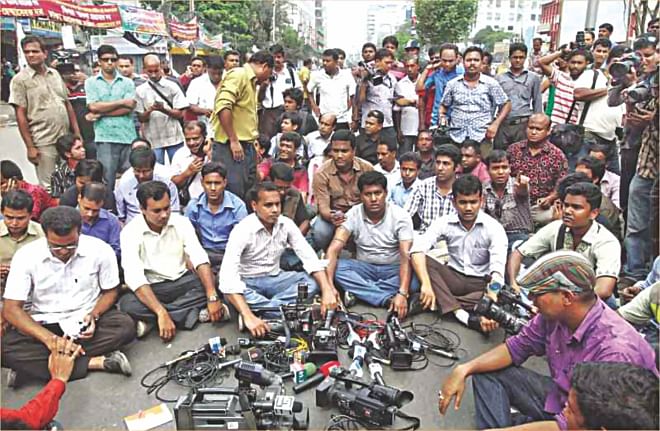Press freedom and airing new TV channels

At the very eleventh hour, government has provided permission for a total of 13 licenses. As the news appeared in The Daily Star (November 26, 2013); the number of private television channels reaches to 27 and the Awami League-led grand alliance government alone has approved 12 during its tenure from 2009. Many readers abroad might think that there is a spontaneous press flow all over the country; the reality is slightly different though.
It has been stated in Article 39(1) of the constitution, “Freedom of thought and conscience is guaranteed”. However, there are apparently reasonable restrictions applied for freedom of expression and press. As we go further, it has been stated in the Article 39(2), “Subject to any reasonable restrictions imposed by law in the interests of the security of the State, friendly relations with foreign states, public order, decency or morality, or in relation to contempt of court, defamation or incitement to an offence– (a) the right of every citizen to freedom of speech and expression; and (b) freedom of the press, are guaranteed”. Articles 36, 37 and 38 have also guaranteed the fundamental rights having links with press freedom. Would the inclusion of new private television channels and FM radio help realising those rights?
In recent times, many journalists got injured as they intended to collect news of turbulent situation. As reported in many newspapers, a group of miscreants involved with different political parties deliberately targeted journalist and threw crude bombs in different locations across the country. Cameramen and journalists are at increased risk as parties in power and opposition alliance are now locked in horns. While performing professional duties, journalists on some occasions were beaten by police as well.
Moreover, it has been several months since editors of prominent newspapers made an appeal (May 19, 2013) to the government. Editors in a joint statement demanded reopening of the press of daily Amar Desh, freeing its acting editor Mahmudur Rahman and allowing the broadcast of Diganta and Islamic TVs. Editors also noted that the arrest of an editor, stopping the publication of a newspaper and the broadcast of two TV channels are sending a negative message to the world about Bangladesh’s democratic values, culture, and tolerance. In one hand, government is allowing a bulk of TV channels to be on air. On the other hand, call made by eminent editors appeared to fall on deaf ears.
Will those channels add value? It appears that there are acute shortages of trained people in media. It would obviously take some time, if authorities of new appearance want to train up recruits. If they depend on existing human resource, current broadcaster might suffer to continue airing quality programme for the viewers. Though it is also possible to get advantage from competitive atmosphere, it requires adequate preparation and homework. It is interesting to note that politicians and businesspeople affiliated with the current regime mostly got permission to air channels. Have they completed their homework?
To conclude, there is hardly any diversity in developing programme for specific group of audience among local television channels in the country. Mostly, they focus on news and entertainments though some of the channels have simply emerged as news channels. There are scopes for full-time education TV or a channel on environmental issues. Prospect of dedicated channels for children needs to be explored in order to help reduce dependency on foreign channels as well. Diversity in electronic media would help the cause of press freedom.
The writer is a human rights worker.

 For all latest news, follow The Daily Star's Google News channel.
For all latest news, follow The Daily Star's Google News channel. 



Comments